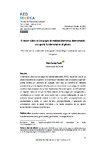Mostrar o rexistro simple do ítem
El vector lúdico en los juegos de realidad alternativa: desmontando una aporía fundamental en el género
| dc.contributor.author | Ruiz García, David | |
| dc.date.accessioned | 2023-10-27T15:57:38Z | |
| dc.date.available | 2023-10-27T15:57:38Z | |
| dc.date.issued | 2023-06-26 | |
| dc.identifier.citation | Ruiz-García, D. (2023). El vector lúdico en los juegos de realidad alternativa: desmontando una aporía fundamental en el género. Redmarka. Revista de Marketing Aplicado, 27(1), 21-39. https://doi.org/10.17979/redma.2023.27.1.9604 | es_ES |
| dc.identifier.issn | 1852- 2300 | |
| dc.identifier.uri | http://hdl.handle.net/2183/33965 | |
| dc.description.abstract | [Resumen] El elemento lúdico en los juegos de realidad alternativa (ARG) resulta ser una de las piezas medulares de un género provisional por naturaleza. Esta circunstancia que bien podría tenerse por previsible en cualquier otro caso, se convierte en relevante precisamente por la negativa del dispositivo a reconocerse como juego, en sentido canónico. Bajo el amparo de su claim fundacional, This is not a game, los ARG plantean un régimen lúdico en el que los ítems clásicos de los juegos son transgredidos y camuflados en el mundo real como parte más o menos indistinguible de este. El presente trabajo pretende analizar lo lúdico en los ARG, conceptualizando sus peculiaridades a través un nuevo término, contragamificación, y generando una conversación entre la faceta normativa y la faceta disruptiva de un género acostumbrado a situarse en la frontera. | es_ES |
| dc.description.abstract | [Abstract] The ludic element in alternate reality games (ARGs) turns out to be one of the core elements of a provisional genre by nature. This circumstance, which would be predictable in any other case, becomes relevant precisely because of the device's refusal to recognise itself as a game, in t he canonical sense. In keeping with their founding claim that This is not a game , ARGs propose a gaming regime in which the traditional features of games are transgressed and camouflaged as more or less indistinguishable parts of the real world. The aim of this article is to analyse the element of play in ARGs and conceptualise the genre under the term degamification , in order to explore the dialogue between the normative and disruptive facets of a medium used to occupying the borderland between reality and fiction, and between gaming and advertising. | es_ES |
| dc.language.iso | spa | es_ES |
| dc.publisher | Universidade da Coruña, Servizo de Publicacións | es_ES |
| dc.relation.uri | https://doi.org/10.17979/redma.2023.27.1.9604 | es_ES |
| dc.rights | Atribución-CompartirIgual 4.0 Internacional | es_ES |
| dc.rights.uri | https://creativecommons.org/licenses/by-sa/4.0/deed.es | |
| dc.subject | Branded content | es_ES |
| dc.subject | Narrativa transmedia | es_ES |
| dc.subject | Juegos de realidad alternativa | es_ES |
| dc.subject | Branded entertainment | es_ES |
| dc.subject | Gamificación | es_ES |
| dc.subject | Contragamificación | es_ES |
| dc.subject | Transmedia storytelling | es_ES |
| dc.subject | Alternate reality games | es_ES |
| dc.subject | Branded entertainment | es_ES |
| dc.subject | Game studies | es_ES |
| dc.subject | Gamification | es_ES |
| dc.subject | Digamification | es_ES |
| dc.title | El vector lúdico en los juegos de realidad alternativa: desmontando una aporía fundamental en el género | es_ES |
| dc.type | info:eu-repo/semantics/article | es_ES |
| dc.rights.access | info:eu-repo/semantics/openAccess | es_ES |
| dc.date.updated | 2023-10-27T14:15:22Z | |
| UDC.journalTitle | Redmarka. Revista de Marketing Aplicado | es_ES |
| UDC.volume | 27 | es_ES |
| UDC.issue | 1 | es_ES |
| UDC.startPage | 21 | es_ES |
| UDC.endPage | 39 | es_ES |
| dc.identifier.doi | 10.17979/redma.2023.27.1.9604 |
Ficheiros no ítem
Este ítem aparece na(s) seguinte(s) colección(s)
-
REV - REDMARKA - Nº 27 (1), 2023 [8]
Retos del marketing en el primer cuarto de siglo XXI






